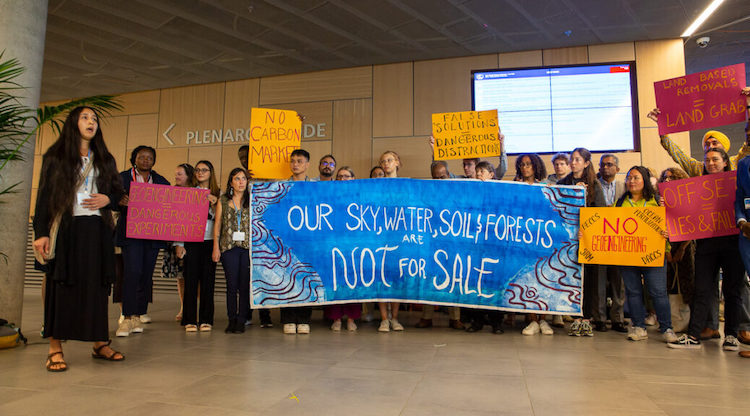By Rita Joshi
BONN | NEW DELHI 11 July 2023 (IDN) — More than 125 civil society groups have expressed concerns that big polluters continue emitting under the cover of deceiving net zero claims while communities and ecosystems across the world suffer immensely. They see an urgent need for real, deep, and urgent emission reductions in line with principles of fair shares starting with just and equitable phase out of fossil fuels. (P10) GERMAN | JAPANESE
Silvia Ribeiro of ETC group of Mexico said: “It is absurd that a mechanism under the Paris Agreement would consider accepting geoengineering technologies such as Direct Air Capture, Ocean Fertilization, and techniques to alter ocean chemistry, among others.”
Ribeiro believes there is no evidence these technologies can effectively and permanently remove carbon from the atmosphere, while also posing great environmental and social risks. More importantly, they could be used as an excuse by Big Polluters to avoid cutting down emissions. As an array of UN bodies have placed moratoria prohibiting these technologies, it is essential the United Nations Framework Convention on Climate Change (UNFCC) respects their decision.
There is no time to waste on climate action when climate impacts are occurring increasingly frequently and violently around the world. Under the cover of deceptive net zero claims, big polluters continue to emit, while communities and ecosystems suffer greatly. In line with fair share principles, we need to reduce emissions in a real, deep, and urgent way, beginning with a just and equitable phase out of fossil fuels.
Tom Goldtooth, Executive Director of the Indigenous Environmental Network emphasized that a global phase out of fossil fuels should be prioritized when it comes to climate mitigation efforts. Carbon markets, offsets, pricing and removals will not suffice for the disproportionately impacted Indigenous Peoples around the world, he asserted.
According to Goldtooth, these strategies have only brought about rights violations, land grabbing and further disproportionate impacts in the past 20 years. Therefore, he urges the Supervisory Body of Article 6.4 of the Paris Agreement to acknowledge his plea to call an end to carbon markets, offsets and carbon pricing; Mother Earth demands that fossil fuels stay in the ground.
More carbon markets, offsets and removals must not be considered as solutions. Indigenous Peoples have experienced 20 years of history with these that have resulted in rights violations, land grabbing, and disproportionate impacts. The Supervisory Body of Article 6.4 of the Paris Agreement must hear our demands to end the era of carbon markets, offsets and carbon pricing. Mother Earth demands that fossil fuels stay in the ground.
Lise Masson of Friends of the Earth International (FOEI) said: “The UN body discussing provisions regarding carbon removals can’t allow itself to be influenced by the industry and open the door to dangerous distractions in the form of land-based and technological removals.”
“The science and evidence couldn’t be clearer: offsets won’t save the day. They harm communities in the Global South, small peasant farmers, and Indigenous Peoples first and foremost. Let’s stop wasting time and commit to the urgent, deep, and real emission reductions we need,” Masson added.
Gadir Lavadenz, Global Coordinator for the Global Campaign to Demand Climate Justice, highlighted an issue of direct and clear conflict of interest: enabling industries which have been driving climate change and thwarting swift action for many years to play a role in the decision-making process.
The overseeing body’s consultation process has given a chance to participants who favour market strategies and the CDR industry to further bolster their agendas, thus damaging the procedure itself. It is essential that UNFCCC does not let this irregular power of the CDR sector proceed, but rather places value on grassroots choices for real people-led outcomes.
Read Open Letter of Rachitaa Gupta, Communications Officer of the Global Campaign to Demand Climate Justice; to the Supervisory Body Members, Article 6.4 of the Paris Agreement. [IDN-InDepthNews]
Photo credit: Global Campaign to Demand Climate Justice.












